2018秋期八年级英语下册Unit2CommunicationLesson4AnimalTalk同步练习新版北师大版【经典版】.doc
- 格式:doc
- 大小:54.47 KB
- 文档页数:6
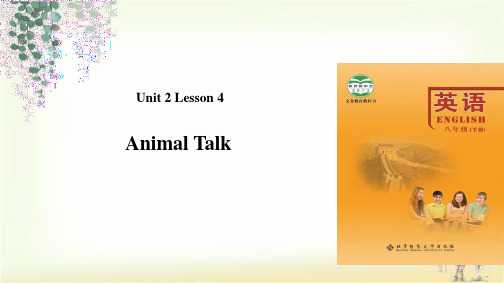

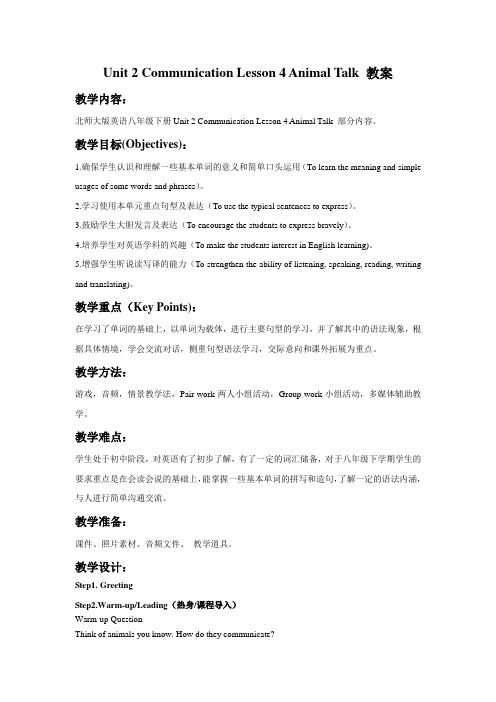
Unit 2 Communication Lesson 4 Animal Talk 教案教学内容:北师大版英语八年级下册Unit 2 Communication Lesson 4 Animal Talk 部分内容。
教学目标(Objectives):1.确保学生认识和理解一些基本单词的意义和简单口头运用(To learn the meaning and simple usages of some words and phrases)。
2.学习使用本单元重点句型及表达(To use the typical sentences to express)。
3.鼓励学生大胆发言及表达(To encourage the students to express bravely)。
4.培养学生对英语学科的兴趣(To make the students interest in English learning)。
5.增强学生听说读写译的能力(To strengthen the ability of listening, speaking, reading, writing and translating)。
教学重点(Key Points):在学习了单词的基础上,以单词为载体,进行主要句型的学习,并了解其中的语法现象,根据具体情境,学会交流对话,侧重句型语法学习,交际意向和课外拓展为重点。
教学方法:游戏,音频,情景教学法,Pair-work两人小组活动,Group-work小组活动,多媒体辅助教学。
教学难点:学生处于初中阶段,对英语有了初步了解,有了一定的词汇储备,对于八年级下学期学生的要求重点是在会读会说的基础上,能掌握一些基本单词的拼写和造句,了解一定的语法内涵,与人进行简单沟通交流。
教学准备:课件、照片素材、音频文件、教学道具。
教学设计:Step1. GreetingStep2.Warm-up/Leading(热身/课程导入)Warm-up QuestionThink of animals you know. How do they communicate?ExampleI think ants communicate by smell....Step3.Presentation(呈现新课)1.Words Learning!1)老师放映课件,用中文询问同学看到了什么?同学们会看到课件上呈现的图画。
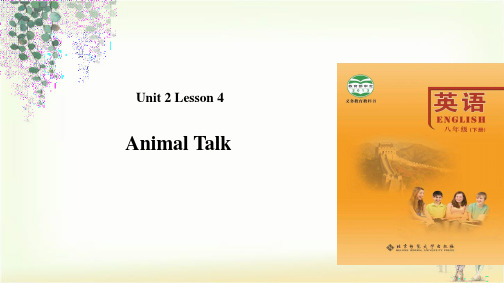
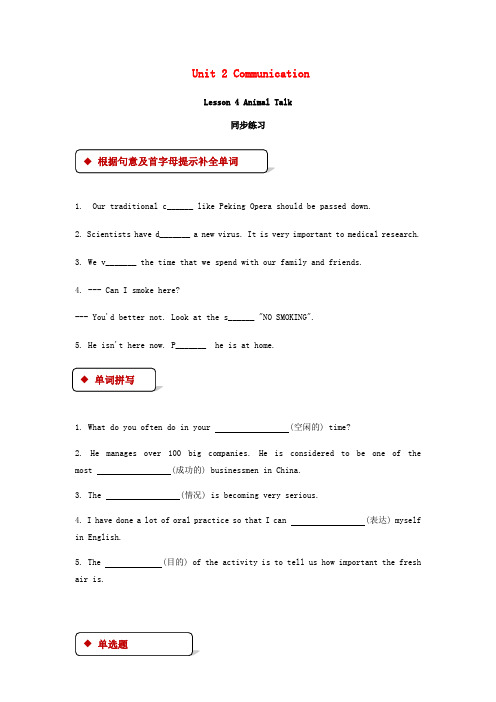
Unit 2 CommunicationLesson 4 Animal Talk同步练习1. Our traditional c______ like Peking Opera should be passed down.2. Scientists have d_______ a new virus. It is very important to medical research.3. We v_______ the time that we spend with our family and friends.4. --- Can I smoke here?--- You'd better not. Look at the s______ "NO SMOKING".5. He isn't here now. P_______ he is at home.1. What do you often do in your (空闲的) time?2. He manages over 100 big companies. He is considered to be one of the most (成功的) businessmen in China.3. The (情况) is becoming very serious.4. I have done a lot of oral practice so that I can (表达) myself in English.5. The (目的) of the activity is to tell us how important the fresh air is.1. People in some areas don’t have to pay for their ______.A. medicine treatB. medical treatC. medicine treatmentD. medical treatment2. Mrs. White has _____ that she is not able to get a job.A. so little educationB. such little educationC. so a little educationD. such a little education3. ______ hard work it is!A. What aB. How aC. WhatD. How4. Is Tom at school today? No, He’s at home ______ he has a bad cold.A. becauseB. ifC. untilD. before5. ---Would you like to go out for a walk with us?---_____, but I must finish my homework first.A. Of course notB. That’s all rightC. I’d love t oD. Yes, I do6. It’s necessary ______ us to keep our pets clean everyday.A. ofB. forC. withD. between7. How I _____ I could live on the moon.A. thinkB. hopeC. wantD. wish8. Last Friday I saw some boys ______ behind Daniel, _____ the computer games.A. sit, watchingB. sitting, watchC. sit, watchD. sitting, watched9. The car is _____ expensive _____ he can’t buy it.22A. too, toB. so, thatC. such, thatD. enough, that10. The foreigners _________there, but they _________the food there at first.A. used to live, didn’t be used toB. are used to living, didn’t use toC. used to live, weren’t used toD. used to living, usedn’t toHow Do People Pass on Messages(信息)?When you write a letter or make a telephone call, your words carry a message. People communicate(交流) with words. Do you think you can communicate without words? Tears in your eyes tell others that you are sad. _______When you put up your hand in class, the teacher knows you want to say something or ask questions. You shake(摇动) your head, and people know you are saying no. ______ Other things can also give some information(信息). For example, a sign at the bus stop helps you to know which bus to take. A sign on the wall of your school helps you to find the library. _________ There are a lot of signs around you and you receive(接收) messages from them all the time.People can communicate in many other ways. An artist can use his pictures to tell about beautiful mountains, the blue sea and many other things. _______They also tell about people and their ideas. Books, magazines, TV, radio and movies all help us to communicate with other people. They all help us to know what is going on in the world.A. You nod (点头), and people know you are saying yes.B. Books are written to tell you about all great things in the world.34 4 C. A smile on your face shows you are happy and friendly.D. Signs on doors tell you how to go in or out.51. People can't go to Sweet Tomatoes for a meal.A. on SundayB. on MondayC. on TuesdayD. on Thursday2. Anna may call to order the seats, because she lives near Wangfujing.A. (010) 2341 1182B. (010) 2332 6531C. (010) 2369 7341D. (010) 2369 14733. What is a "coupon" used for?A. To save money.B. To get a VIP card.C. To invite a friend.D. To be a reader of China Daily.4. Where would you probably read this passage?A. In a novel.B. In a newspaper.C. In a math book.D. In a story book.5. Mr. and Mrs. Black visited Sweet Tomatoes with two kids, Sara, age 10; Tom, age5. They have to pay for the meal.A. ¥110 B. ¥120 C. ¥150 D. ¥180参考答案1. culture(s) 42. discovered 43. value 44. sign 45. Perhaps1. spare2. successful3. situation4. express5. purpose1. D2. A3. C4. A5. C6. B7. D8. A9. B10. C61. C2. A3. D4. B1. B2. D3. A4. B5. C7。
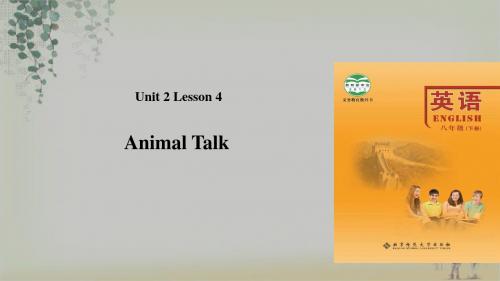
Unit 4 CommunicationLesson 5 Meeting People本课是北师大版《初中英语》八年级下册教材第二单元的第五课,话题为人际交往。
本课是一节听力课,内容涉及单元话题communication中的face to face communication这一子话题。
本课的听力材料是关于某班学生和老师谈论如何接待外国访问学生的内容,其中包含了对中外文化差异的讨论。
学生首先通过阅读校园网上有关外国学生和老师来访的新闻了解任务,结合自己的已知进行头脑风暴思考如何接待外国客人。
在学生感到完成此任务有困难时,运用记笔记的听力策略获取文章中的有关该班学生计划如何接待外国学生的信息。
而后,运用预测等听力策略,小组讨论有关接待时需要注意的内容并通过勾选信息验证预测,在这个过程中重点训练学生听材料直接获取信息和筛选信息的能力。
最后学生参考从课文中听出的信息,结合自己想法完成设计接待外国客人的任务。
【知识与能力目标】1. Key vocabulary2. Key structures【过程与方法目标】1.运用预测等听力技能,听录音说出老师所建议的接待过程中需要注意的事项;2.根据所听到的例文,具体写出最终接待外宾时要做的事情2 2【情感态度价值观目标】在设计如何接待外宾的真实交际过程中,避免不恰当的言行,尊重文化差异。
【教学重点】Learn to talk about the animals.【教学难点】学习反身代词Tape recorder, MultimediaStep 1. BrainstormSs read a piece of news on the website of our school.Step 2. Warm-upSs read the task on their worksheet:School NewsA group of English students and their teacher are going to visit our school next week. Let’s do something to give them an unforgettable experience in our school. We are looking forward to your participation.Step 3. GrammerSs brainstorm what they want to do to welcome the students from England.Q: What can you do when you meet them on the first day?(T writes down the key phrases of what Ss mention on the blackboard.)Step 4. Discuss1.Group discussion(1) Ss form groups of 4 and decide what they want to take charge of.(2) Ss listen to the tape again and write down the key information their group needs.2. Task preparation 2:Ss discuss and write down what they shou ldn’t do according to the different groups. Ss talk about and predict the reason why they shoul dn’t do those things in pairs. Ss listen again and check their predictions.Step 5 Talking1. Ss list the things they are going to do in groups on their worksheet.2. Ss decide the duty for each one in the group and write it down in the table.3. Ss think about more details about their duty individually and take notes if necessary.Q: What are you going to do?How can you do it? And why?4.Ss share their ideas in groups and revise it if necessary.Step 6 Homework1 Read the text.2写下并修改本组的计划3略。
Unit 2 CommunicationLesson 4 Animal Talk同步练习1. Our traditional c______ like Peking Opera should be passed down.2. Scientists have d_______ a new virus. It is very important to medical research.3. We v_______ the time that we spend with our family and friends.4. --- Can I smoke here?--- You'd better not. Look at the s______ "NO SMOKING".5. He isn't here now. P_______ he is at home.1. What do you often do in your(空闲的) time?2. He manages over 100 big companies. He is considered to be one of the most (成功的) businessmen in China.3. The (情况) is becoming very serious.4. I have done a lot of oral practice so that I can (表达) myself in English.5. The (目的) of the activity is to tell us how important the fresh air is.1. People in some areas don’t have to pay for their ______.A. medicine treatB. medical treatC. medicine treatmentD. medical treatment2. Mrs. White has _____ that she is not able to get a job.A. so little educationB. such little educationC. so a little educationD. such a little education3. ______ hard work it is!A. What aB. How aC. WhatD. How4. Is Tom at school today? No, He’s at home ______ he has a bad cold.A. becauseB. ifC. untilD. before5. ---Would you like to go out for a walk with us?---_____, but I must finish my homework first.A. Of course notB. That’s all rightC. I’d love t oD. Yes, I do6. It’s necessary ______ us to keep our pets clean everyday.A. ofB. forC. withD. between7. How I _____ I could live on the moon.A. thinkB. hopeC. wantD. wish8. Last Friday I saw some boys ______ behind Daniel, _____ the computer games.A. sit, watchingB. sitting, watchC. sit, watchD. sitting, watched9. The car is _____ expensive _____ he can’t buy it.A. too, toB. so, thatC. such, thatD. enough, that10. The foreigners _________there, but they _________the food there at first.A. used to live, didn’t be used toB. are used to living, didn’t use toC. used to live, weren’t used toD. used to living, usedn’t toHow Do People Pass on Messages(信息)?When you write a letter or make a telephone call, your words carry a message. People communicate(交流) with words. Do you think you can communicate without words? Tears in your eyes tell others that you are sad. _______When you put up your hand in class, the teacher knows you want to say something or ask questions. You shake(摇动) your head, and people know you are saying no. ______ Other things can also give some information(信息). For example, a sign at the bus stop helps you to know which bus to take. A sign on the wall of your school helps you to find the library. _________ There are a lot of signs around youand you receive(接收) messages from them all the time.People can communicate in many other ways. An artist can use his pictures to tell about beautiful mountains, the blue sea and many other things. _______They also tell about people and their ideas. Books, magazines, TV, radio and movies all help us to communicate with other people. They all help us to know what is going on in the world.A. You nod (点头), and people know you are saying yes.B. Books are written to tell you about all great things in the world.C. A smile on your face shows you are happy and friendly.D. Signs on doors tell you how to go in or out.1. People can't go to Sweet Tomatoes for a meal.A. on SundayB. on MondayC. on TuesdayD. on Thursday2. Anna may call to order the seats, because she lives near Wangfujing.A. (010) 2341 1182B. (010) 2332 6531C. (010) 2369 7341D. (010) 2369 14733. What is a "coupon" used for?A. To save money.B. To get a VIP card.C. To invite a friend.D. To be a reader of China Daily.4. Where would you probably read this passage?A. In a novel. B . In a newspaper. C. In a math book.D. In a story book. 5. Mr. and Mrs. Black visited Sweet Tomatoes with two kids, Sara, age 10; Tom, age 5. They have to pay for the meal.A. ¥110B. ¥120C. ¥150D. ¥180参考答案1. culture(s) 42. discovered 43. value 44. sign45. Perhaps1. spare2. successful3. situation4. express5. purpose1. D2. A3. C4. A5. C6. B7. D8. A9. B10. C 1.C2. A3. D4. B1. B2. D3. A4. B5. C。